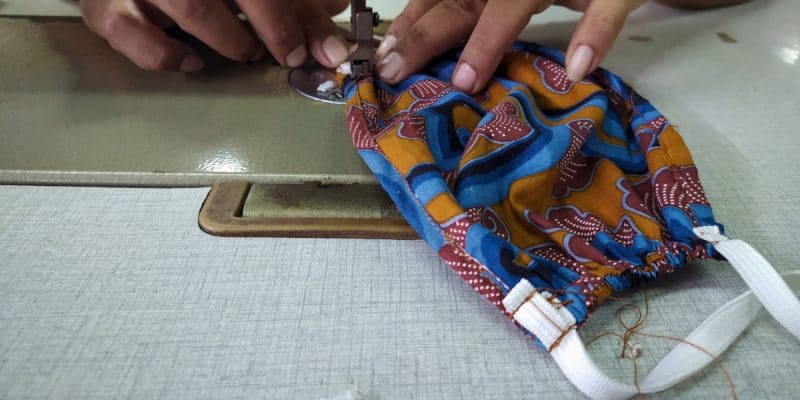To fight against the spread of the coronavirus in Benin, a startup in the fashion industry proposes the use of cloth masks. Unlike surgical and disposable masks, cloth masks, intended for the public, are reusable and durable.
Cloth masks are part of the measures to combat the spread of coronavirus in Benin. Following the declaration, on March 16, 2020, of a first confirmed case of coronavirus in this West African country, the Jerry Sinclair workshops suspended the manufacture of clothing for the production of cloth masks. “Until now, only disposable masks have been commercially available. We were very concerned about the purchasing power of the population and the damage this could cause to the environment. How many disposable masks can we buy per day knowing that their life span is 3 hours? We asked ourselves, and that’s what justifies our choice,” explained Jerry Sinclaire Aguenoukoun, the owner of the eponymous startup.
The fabric masks are mainly intended for the public. They are hygienic and reusable provided they are washed daily with detergent and ironed with a hot iron. Those from the Jerry Sinclaire workshops come with instructions for use: plan two masks per day, handle the mask only when wearing and removing it and always hold it by the elastic band; wash them at a temperature of at least 30° with a conventional detergent. However, these instructions, warns the manufacturer, must not prevent the user from observing the other simple gestures recommended by the World Health Organization (WHO) to avoid contagion.
China’s experience warns against disposable masks
“Our masks are therefore of triple interest: to safeguard the masks intended for healthcare personnel to avoid overbidding and shortages, to protect the purchasing power of populations and to safeguard the environment,” said Jerry Sinclaire Aguenoukoun.
The use of cloth masks could help not only Benin, but also other infected countries, to combat the spread of Covid-19 while avoiding pollution due to the massive and excessive use of disposable masks. For a single person, nearly ten masks are needed per day, since these masks have a lifespan of between 3 and 4 hours.
On February 28, 2020 in China where the Coronavirus appeared, activists of the OceanAsia association spotted a new source of pollution caused by surgical masks. The association denounced the presence of thousands of these disposable masks already worn on the beaches of Hong Kong and in urban areas of China.
However, it is necessary to recall an essential rule: for a fabric mask to stop the microdroplets emitted by coughing or sneezing, a cloth must be placed that allows microscopic filtration.
Boris Ngounou







